Select Language
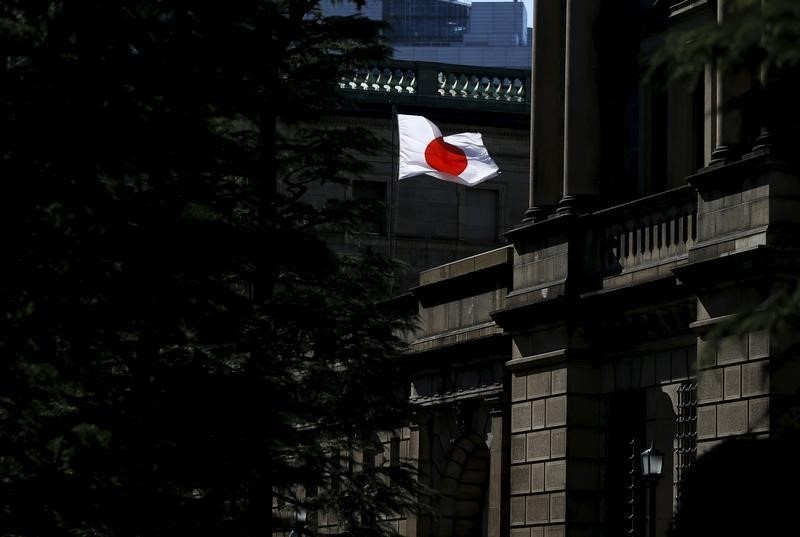
Investing.com-- The Bank of Japan is widely expected to keep interest rates on hold at the conclusion of a meeting this week, although an improved outlook for Japanese wages and a sharp decline in the yen may elicit hawkish signals from the central bank.
The BOJ is set to keep its benchmark interest rate at 0.1%, after hiking the rate from negative territory in March- its first rate increase since 2007. The BOJ had also largely ended its yield curve control and asset buying measures.
While the move did mark a shift in the BOJ’s policy, the central bank had offered a largely dovish outlook on future rate moves. The bank had signaled it would keep monetary conditions accommodative in the near-term, with the intent to foster economic growth in Japan.
But the factors that had initially driven the BOJ’s March rate hike still remained in play. Chiefly, Japanese wage growth is expected to pick up in the coming months, especially after major labor unions in the country won bumper wage hikes for the year.
BOJ Governor Kazuo Ueda signaled that higher wages and inflation will eventually draw more rate hikes by the BOJ this year. But he also emphasized on the need for loose policy in the near-term, citing a fragile Japanese economy.
The case for a hawkish BOJ
A recent pick-up in Japanese inflation- from two-year lows- could see the BOJ hike its inflation outlook for the year. Such a scenario also appears more likely in the face of stronger wage growth this year.
Recent purchasing managers index data also showed Japanese business activity remained resilient- a trend that is also expected to continue with strong wage growth.
Signs of resilience in the Japanese economy, coupled with stickier inflation, give the BOJ more impetus and headroom to tighten monetary policy.
Additionally, recent weakness in the yen- where the USDJPY pair hit 34-year highs above 155- could also draw hawkish rhetoric from the BOJ, if only to stem a slide in the currency.
The yen has seen little support despite repeated warnings of currency market intervention by Japanese officials. Such a scenario could pressure Ueda into supporting the yen through hawkish commentary.
Pressure on Ueda to act could also come from fears of a scenario as that seen in 2022. Ueda’s predecessor, Haruhiko Kuroda, had avoided supporting the yen- a trend that saw the currency slump to 1990 lows, which in turn attracted record levels of intervention by the Japanese government.
“We expect the BoJ to keep its policy target unchanged, but the market’s focus should be on its quarterly outlook report. Given higher inflation in the first quarter, stronger-than-expected wage growth, and a weaker-than-expected yen, we expect the inflation outlook to be revised up,” analysts at ING wrote in a note.
“We believe that the BoJ’s rate hike expectations will grow as the year progresses.”
How will USDJPY react?
Inaction by the BOJ exposes tBut any hawkish signals from the central bank are likely to spark strong gains in the yen, dragging the USDJPY pair away from 34-year highs.
Still, any recovery in the yen is expected to be limited, given that the main point of pressure on the currency, which is higher-for-longer U.S. interest rates- has only worsened in recent weeks.
How will the Nikkei 225 react?
The Nikkei 225 was slapped with a heavy bout of profit-taking in April after a strong performance in the first quarter. Any hawkish rhetoric from the BOJ is likely to worsen the Nikkei’s losses, given that higher Japanese interest rates will mark an end to nearly a decade of easy monetary policy enjoyed by Japanese stocks.
An ultra-dovish BOJ was a key point of support for the Nikkei 225 over the past two years.
Still, analysts at UBS said that Japanese stocks retained more potential for upside, especially on the back of strong earnings. he yen to even more downside pressure- a trend that, barring any intervention by the Japanese government, could see the USDJPY pair push further beyond 155.

By Stephen Nellis
SANTA CLARA, California (Reuters) -Taiwan Semiconductor Manufacturing Co said on Wednesday that a new chip manufacturing technology called "A16" will enter production in the second half of 2026, setting up a showdown with longtime rival Intel (NASDAQ:INTC) over who can make the world's fastest chips.
TSMC, the world's biggest contract manufacturer of advanced computing chips and a key supplier to Nvidia (NASDAQ:NVDA) and Apple (NASDAQ:AAPL), announced the news at a conference in Santa Clara, California, where TSMC executives said that makers of AI chips will likely be the first adopters of the technology rather than a smartphone maker.
Analysts told Reuters that the technologies announced on Wednesday could call into question Intel's claims in February that it will overtake TSMC in making the world's fastest computing chips with a new technology Intel calls "14A."
Kevin Zhang, TSMC's senior vice president of business development, told reporters that the company has developed its new A16 chipmaking process faster than expected because of demand from AI chip firms, without naming specific customers.
AI chip firms "really want to optimize their designs to get every ounce of performance we have," Zhang said.
Zhang said that TSMC does not believe it needs to use a ASML (AS:ASML)'s new "High NA EUV" lithography tool machines to build the A16 chips. Intel last week revealed that it plans to be the first to use the machines, which can cost $373 million each, to develop its 14A chip.
TSMC also revealed a new technology for suppling power to computer chips from the backside of the chip, which helps speed up AI chips and will be available in 2026.
Intel has announced a similar technology intended to be one of its primary competitive advantages.
Analysts said the announcements called into question Intel's claims that it will retake the world chipmaking crown.
"It's debatable, but on some metrics, I don't think they're ahead," Dan Hutcheson, vice chair at analyst firm TechInsights, said of Intel.
But Kevin Krewell, a principal at TIRIAS Research, cautioned that both Intel and TSMC's technologies remain years away from delivering the technology and will need to prove that real chips match their keynote presentations.
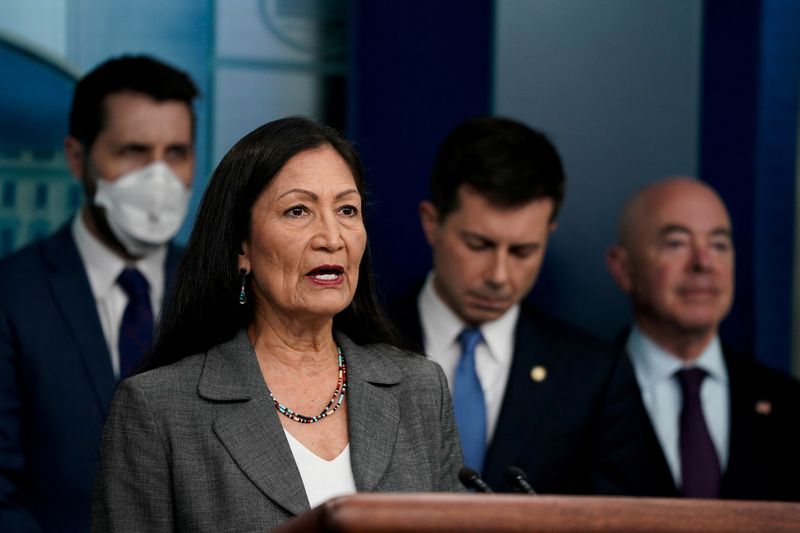
By Nichola Groom
(Reuters) -U.S. President Joe Biden's administration unveiled plans on Wednesday to hold up to a dozen auctions of offshore wind development rights through 2028, including four before the end of this year.
The schedule will help companies, states and others plan for projects that require massive amounts of investment and infrastructure, the Interior Department said in a statement.
Interior has held just four offshore wind auctions since Biden took office in 2021. The last one, in the Gulf of Mexico last August, attracted lackluster industry interest.
The agency will regularly update the schedule under new regulations finalized on Wednesday. The rules will streamline certain requirements for offshore wind development and cut industry costs by $1.9 billion over the next two decades, Interior said.
"Our offshore wind leasing schedule will provide predictability to help developers and communities plan ahead and will provide the confidence needed to continue building on the tremendous offshore wind supply chain and manufacturing investments that we've already seen," Interior Secretary Deb Haaland said in a statement.
The administration is determined to support the nascent U.S. offshore wind industry at a time when projects have been plagued by rising costs tied to inflation, interest rates and supply chain constraints.
Just this week, New York state stalled three major planned offshore wind farms.
According to Interior's schedule, this year the agency will hold lease sales for areas in the Central Atlantic, Gulf of Maine, Gulf of Mexico and Oregon.
In 2025, it will hold a single sale in the Gulf of Mexico.
In 2026, it will hold an auction in the Central Atlantic. In 2027, two sales are scheduled - the Gulf of Mexico and New York Bight.
In 2028, Interior aims to hold four auctions - in California, an undetermined U.S. territory, the Gulf of Maine and Hawaii.
The timing of the sales is linked to the administration's five-year schedule to offer acreage to oil and gas companies for offshore development. A provision in Biden's landmark climate change law, the Inflation Reduction Act, requires that Interior must offer at least 60 million acres (24.3 million hectares) for oil and gas leasing a year before issuing an offshore wind lease.
The U.S. last held an oil and gas auction in December of last year and will not hold another one until 2025 under a scaled back five-year drilling plan finalized last year.
In addition to establishing a leasing schedule, the offshore wind regulations finalized on Wednesday eliminate requirements for meteorological buoys, defer some survey requirements until a project is approved and allow incremental funding of decommissioning accounts over the life of a facility.
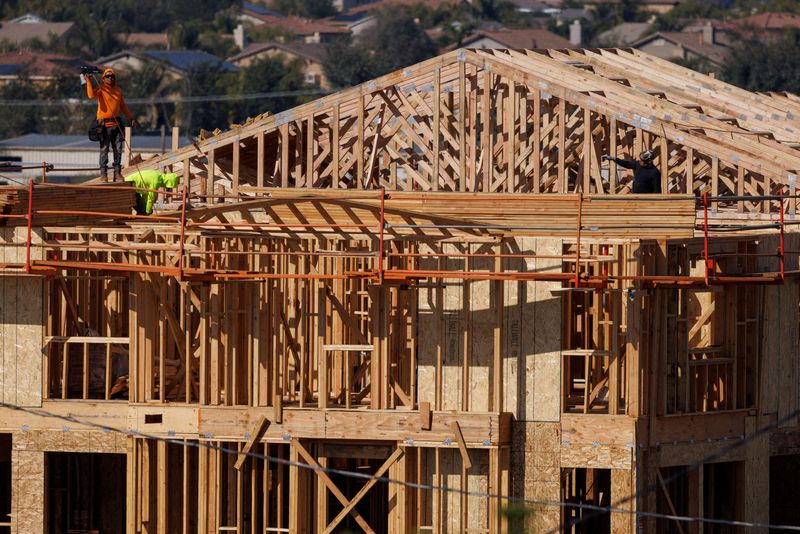
By Lucia Mutikani
WASHINGTON (Reuters) - Sales of new U.S. single-family homes rebounded in March from February's downwardly revised level, drawing support from a persistent shortage of previously owned houses on the market, but momentum could be curbed by a resurgence in mortgage rates.
The report from the Commerce Department on Tuesday also showed the median house price jumped to a seven month-high from February, likely as fewer builders offered price cuts and sales shifted to higher priced homes. Rising prices and mortgage rates could make housing even more unaffordable, especially for first-time buyers.
"New home sales have remained remarkably strong recently," said Oliver Allen, senior U.S. economist at Pantheon Macroeconomics. "That said, the renewed rise in mortgage rates and dip in mortgage applications over the past couple of months means that new home sales will probably tread water at best in the near-term, while existing home sales will fall."
New home sales jumped 8.8% to a seasonally adjusted annual rate of 693,000 units last month, the highest level since September, the Commerce Department's Census Bureau said. The sales pace for February was revised down to 637,000 units from the previously reported 662,000 units.
Economists polled by Reuters had forecast new home sales, which account for about 14% of U.S. home sales, would advance by a rate of 670,000 units.
New home sales are counted at the signing of a contract, making them a leading indicator of the housing market. They, however, can be volatile on a month-to-month basis. Sales increased 8.3% on a year-on-year basis in March.
Though the new housing market remains underpinned by the dearth of previously owned homes for sale, rising mortgage rates are taking a toll on affordability.
Data last week showed single-family housing starts and building permits declined in March. Sentiment among single-family homebuilders was unchanged in April, with the National Association of Home Builders noting that "buyers are hesitating until they can better gauge where interest rates are headed."
The average rate on the popular 30-year fixed-rate mortgage has risen back above 7%, data from mortgage finance agency Freddie Mac showed, as strong reports on the labor market and inflation suggested the Federal Reserve could delay an anticipated interest rate cut this year. A few economists doubt the U.S. central bank will lower borrowing costs in 2024.
BROAD INCREASE
New home sales rose in all four regions last month, with the Northeast posting a 27.8% surge. Sales in the Midwest gained 5.3% and increased 7.7% in the densely populated South. They vaulted 8.6% in the West.
Despite the weakness in permits last month, economists believed residential investment picked up in the first quarter after slowing considerably in the October-December period.
The government is scheduled to publish its snapshot of gross domestic product for the first quarter on Thursday. Growth estimates for the period are as high as a 3.1% annualized rate. The economy grew at a 3.4% pace in the fourth quarter.
Stocks on Wall Street were trading higher. The dollar fell against a basket of currencies. U.S. Treasury prices rose.
The median new house price increased 6% to $430,700 from February. That was the highest level since last August. Prices, however, slipped 1.9% from a year ago. Most of the new homes sold last month were in the $300,000-$399,999 price range, followed by the $500,000-$749,000 price bracket.
Builders are constructing smaller and cheaper houses, but fewer of them are cutting prices. The NAHB survey last week showed the share of builders cutting prices fell to 22% in April from 24% in March and 36% in December. Fewer builders were also offering incentives to boost sales.
Overall house prices continue to rise because of the supply squeeze in the home resale market. Data from mortgage finance agency Fannie Mae last week showed house prices increased 7.4% on a year-on-year basis in the first quarter compared to a 6.6% rise in the fourth quarter. Fannie Mae upgraded its estimate for home price growth this year to 4.8% from 3.2% previously.
There were 477,000 new homes on the market at the end of March, up from 465,000 units in February. At March's sales pace it would take 8.3 months to clear the supply of houses on the market, down from 8.8 months in February.
Houses under construction accounted for 59.1% of inventory. Homes yet to be built made up 22.2% of supply, while completed houses accounted for 18.7%.

By Milounee Purohit
BENGALURU (Reuters) - The biggest economic challenge for the government after the ongoing election is unemployment, according to economists polled by Reuters who expected the world's most populous country to grow a healthy 6.5% this fiscal year.
Despite growing at the fastest pace among major peers, the economy has failed to generate enough jobs for its large and expanding young population, a key issue among citizens in the midst of electing the next government.
A majority of economists, 15 of 26, in the April 16-23 Reuters poll who answered an additional question said the biggest challenge for the government after the national election would be unemployment.
Eight said rural consumption, two picked inflation and one said poverty.
"Following a decade of near jobless growth, the rising number of discouraged workers had pushed India's LFPR (labour force participation rate) down well below levels exhibited by the four Asian tigers at comparable stages in their demography," said Kunal Kundu, India economist at Societe Generale (OTC:SCGLY).
"Bharatiya Janata Party's focus on existing employment drivers (infrastructure, manufacturing, and government jobs) that have not moved the needle much to date is all the more worrying. Without a more concrete plan, India runs the risk of missing out on potential demographic dividends."
Prime Minister Narendra Modi's BJP, widely expected to return to power for a third straight term, had promised to create more jobs when elected in 2014.
Despite that promise, the unemployment rate over recent years indicates not enough jobs have been added to make a significant difference. Periodic Labour Force Survey data showed the unemployment rate which stood at 3.4% in 2013-14 was only marginally lower at 3.2% in 2022-23.
According to the Centre for Monitoring Indian Economy, an economic think tank, the unemployment rate was 7.6% in March.
Although job creation has stayed lacklustre, the government ramping up of capital expenditure helped the economy grow a faster-than-expected 8.4% in the October-December quarter.
The economy likely grew 6.5% last quarter and 7.6% in the previous fiscal year that ended on March 31, the survey showed.
It was forecast to expand 6.5% and 6.7% this fiscal year and next, broadly unchanged from last month.
"Repeating the exceptional strength of 2023 shouldn't be taken for granted. Last year's growth was strongly supported by the government's capex push, but the need for fiscal prudence will limit the boost this year and over the coming years," said Alexandra Hermann at Oxford Economics.
"We currently see risks to the upside with increasing signs the economy's resilience of last year was maintained into the beginning of 2024."
With various institutes like the International Monetary Fund upgrading India's growth forecast the risk to the outlook was to the upside.
A strong majority of economists, 20 of 28, who answered an additional question said economic growth this fiscal year was more likely to be higher than they expected rather than lower.
Consumer price inflation, at 4.85% in March, was forecast to average 4.5% this fiscal year and next. However, a majority of economists, 19 of 28 said it was more likely inflation would be higher than they currently predict.
(For other stories from the Reuters global economic poll:)
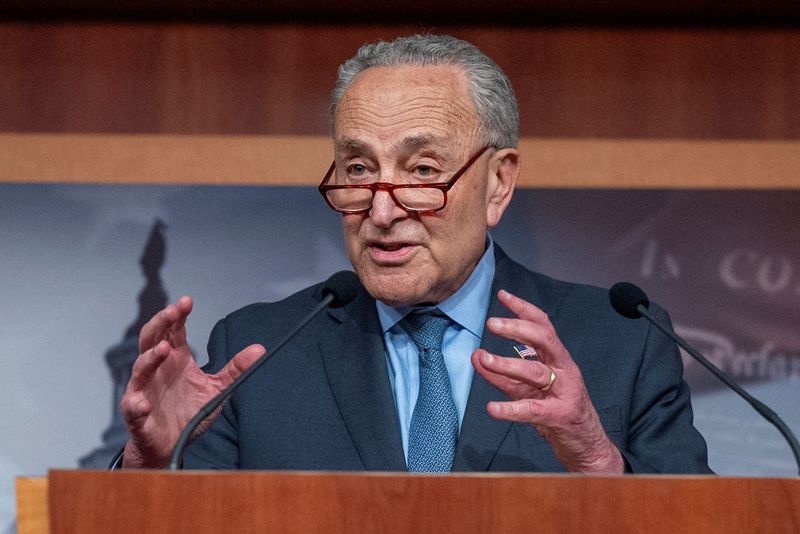
By Patricia Zengerle and Richard Cowan
WASHINGTON (Reuters) -A sweeping foreign aid package easily passed the U.S. Congress late on Tuesday after months of delay, clearing the way for billions of dollars in fresh Ukraine funding amid advances from Russia's invasion force and Kyiv's shortages of military supplies.
The Senate approved by 79 to 18 four bills passed by the House of Representatives on Saturday, after House Republican leaders abruptly switched course last week and allowed a vote on the $95 billion in mostly military aid for Ukraine, Israel and Taiwan and U.S. partners in the Indo-Pacific.
The four bills were combined into one package in the Senate, which President Joe Biden said he would sign into law on Wednesday.
Ukrainian President Volodymyr Zelenskiy said he was grateful to U.S. lawmakers for approving "vital" aid for Ukraine.
"This vote reinforces America's role as a beacon of democracy and leader of the free world," Zelenskiy said in a statement on the Telegram messaging app.
The largest provides $61 billion in critically needed funding for Ukraine; a second provides $26 billion for Israel and humanitarian aid for civilians in conflict zones around the world, and a third mandates $8.12 billion to "counter communist China" in the Indo-Pacific.
A fourth, which the House added to the package last week, includes a potential ban on the Chinese-controlled social media app TikTok, measures for the transfer of seized Russian assets to Ukraine and new sanctions on Iran.
Biden's administration is already preparing a $1 billion military aid package for Ukraine, the first sourced from the bill, two U.S. officials told Reuters. It includes vehicles, Stinger air defense munitions, additional ammunition for high-mobility artillery rocket systems, 155 millimeter artillery ammunition, TOW and Javelin anti-tank munitions and other weapons that can immediately be put to use on the battlefield.
The Senate's Democratic and Republican leaders predicted that Congress had turned the corner in putting Russian President Vladimir Putin and other foreign adversaries on notice that Washington will continue supporting Ukraine and other foreign partners.
"This national security bill is one of the most important measures Congress has passed in a very long time to protect American security and the security of Western democracy,"
Democratic Majority Leader Chuck Schumer told a news conference after the vote.
The aid package could be the last approved for Ukraine until after elections in November when the White House, House of Representatives and one-third of the Senate are up for grabs.
Much of the opposition to the security assistance in both the House and Senate has come from Republicans with close ties to former U.S. President Donald Trump, a Ukraine aid skeptic who has stressed "America First" policies as he seeks a second term.
Senate Republican Leader Mitch McConnell, a strong advocate for assisting Ukraine, expressed regret about the delay, largely due to hardline Republicans' objections to adding more to the $113 billion Washington had authorized for Kyiv since Russia began its full-scale invasion in February 2022.
"I think we’ve turned the corner on the isolationist movement," McConnell told a news conference.
Some of the Ukraine money - $10 billion in economic support - comes in the form of a loan, which Trump had suggested. But the bill lets the president forgive the loan starting in 2026.
'NOW GO WIN THE FIGHT'
The influx of weapons should improve Kyiv's chances of averting a major breakthrough in the east by Russian invaders, although it would have been more helpful if the aid had come closer to when Biden requested it last year, analysts said.
Schumer said he left a message for Zelenskiy on Tuesday night, telling him, "OK, we got it done. Now go win the fight."
It was not immediately clear how the money for Israel would affect the conflict in Gaza. Israel already receives billions of dollars in annual U.S. security assistance, but it more recently has faced its first direct aerial attack by Iran.
Aid supporters hope the humanitarian assistance will help Palestinians in Gaza, which has been devastated by Israel's campaign against Hamas to retaliate for Oct. 7 attacks that killed 1,200 people.
Gaza health authorities say the campaign has led to the deaths of more than 34,000 civilians in the Palestinian enclave.
It was the second time this year that the Democratic-led Senate passed security aid for Ukraine, Israel and the Indo-Pacific. The last bill, more than two months ago, garnered 70% support in the 100-member chamber from Republicans and Democrats. But leaders of the Republican-controlled House would not allow a vote on the foreign aid until last week.
The legislation's progress has been closely watched by industry, with U.S. defense firms up for major contracts to supply equipment for Ukraine and other U.S. partners.
Experts expect the supplemental spending to boost the order backlog of RTX Corp along with other major companies that receive government contracts, such as Lockheed Martin (NYSE:LMT), General Dynamics (NYSE:GD) and Northrop Grumman (NYSE:NOC).
The House passed the Ukraine funding by 311-112, with all "no" votes coming from Republicans, many of whom were bitterly opposed to further assistance for Kyiv. Only 101 Republicans voted for it, forcing Speaker Mike Johnson to rely on Democratic support and prompting calls for his ouster as House leader.
However, the House left Washington for a week-long recess, without triggering a vote to remove Johnson.
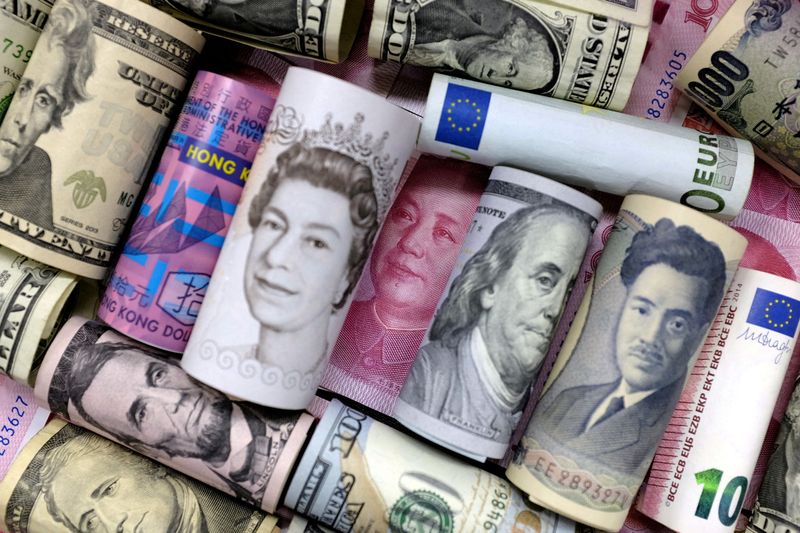
By Kevin Buckland
TOKYO (Reuters) - The dollar nursed its wounds on Wednesday following big tumbles against the euro and sterling, hurt by a combination of surprisingly robust European activity data and cooling U.S. business growth.
However the yen remained mired near a 34-year low versus the U.S. currency, even as Japanese officials stepped up intervention warnings.
The dollar index - which measures the currency against six major peers including the euro, sterling and yen - was flat at 105.64 in early Asian trading after slumping 0.4% overnight and touching the lowest level since April 12 at 105.23.
The euro was little changed at $1.069975 following Tuesday's 0.45% rally, after data showed business activity in the euro zone expanded at its fastest pace in nearly a year, primarily due to a recovery in services.
Sterling also benefited from overnight data showing British businesses recorded their fastest growth in activity in nearly a year, while Bank of England Chief Economist Huw Pill said interest rate cuts remained some way off. Sterling was last steady at $1.24485 having jumped 0.79% in the previous session.
By contrast, U.S. business activity cooled in April to a four-month low due to weaker demand, while rates of inflation eased slightly, suggesting some possible relief for the Federal Reserve.
A major test of that will come Friday with the release of the Fed's preferred consumer inflation measure, the PCE deflator. Markets currently price in a 73% chance of a first rate cut by September, according to the CME's FedWatch tool.
Elsewhere, the Australia's dollar hovered at the highest since April 15 at $0.64875 ahead of consumer inflation figures, after rebounding more than 1% over the past two days following its dip to a five-month low on Friday.
The dollar index reached a 5-1/2-month peak at 106.51 last week as persistent inflation forced Fed officials to signal no rush to ease policy.
Despite the dollar's broader struggles on Tuesday, it still inched up enough at one point to mark a fresh 34-year high to the yen at 154.88. This week, the pair has oscillated in an extremely narrow range between that high and a low of 154.50, with traders wary that a push above 155 could raise the risk of dollar-selling intervention by Japanese officials.
Japanese Finance Minister Shunichi Suzuki on Tuesday issued the strongest warning to date on the chance of intervention, saying last week's meeting with U.S. and South Korean counterparts had laid the groundwork for Tokyo to act against excessive yen moves.
The Bank of Japan is widely expected to leave policy settings and bond purchase amounts unchanged at the conclusion of a two-day meeting on Friday, having just raised interest rates for the first time since 2007 just last month.
And while Japan's central bank is likely to signal a readiness to tighten policy again this year, its ultra-cautious, data-dependent approach has limited any strengthening in the yen.
"Aside from the financial cost, there could be a significant impact on the credibility of the Japanese authorities if FX intervention fails," Rabobank strategist Jane Foley wrote in a client note.
"Historically, FX intervention is most successful if the fundamentals are coincidentally turning in favour of that currency," she said. "USD/JPY may not turn lower until the summer, and this assumes that the Fed can cut rates in September."
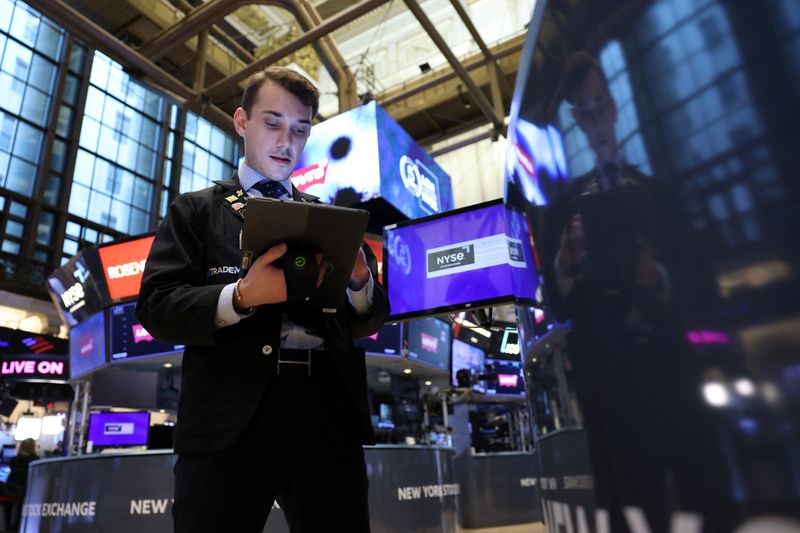
By Chibuike Oguh
(Reuters) -U.S. stocks closed higher on Tuesday following positive earnings from top-tier companies and as investors were focused on quarterly results from Magnificent Seven and other megacap growth stocks.
Tesla (NASDAQ:TSLA) kicked off the earnings cycle for technology heavyweights after markets closed on Tuesday, announcing the launch of new electric vehicle models and quarterly revenue that missed analyst estimates. Its shares jumped 6% in extended hours trading.
That will be followed by results from other tech majors, including Microsoft (NASDAQ:MSFT), Alphabet (NASDAQ:GOOGL), and Meta Platforms (NASDAQ:META), later this week.
Markets were also buoyed by upbeat earnings from companies such as General Motors (NYSE:GM), which closed up 4.4% after the automaker's better-than-expected quarterly results.
Ten out of 11 S&P 500 sectors were advancing led by gains in equities in communication services and technology sectors. The S&P Materials sector ended lower dragged by steelmaker Nucor Corp (NYSE:NUE), which lost ground by 8.9% after a first-quarter earnings miss.
"We're having a continuation of an oversold balance that started yesterday and the catalyst today is that markets are now refocused on earnings reports across a wide array of sectors that were strong," said Keith Lerner, co-chief investment officer at Truist Advisory Services in Atlanta.
The Dow Jones Industrial Average rose 263.71 points, or 0.69%, to 38,503.69, the S&P 500 gained 59.95 points, or 1.20%, to 5,070.55 and the Nasdaq Composite gained 245.34 points, or 1.59%, to 15,696.64.
Data on Tuesday showed that U.S. business activity cooled in April to a four-month low due to weaker demand, while rates of inflation eased slightly even as input prices rose sharply, suggesting possible relief ahead for rising consumer prices.
Investors will be eyeing the release of the March Personal Consumption Expenditures (PCE) index - the Federal Reserve's preferred inflation gauge - which is due on Friday.
Money markets are now pricing in just about 43 basis points of interest-rate cuts, down from about 150 bps seen at the start of the year, according to LSEG data.
"The PMI report was a little bit weaker and the employment was a little bit weaker and the market at this point is taking that is a bad-news-there-is-good-news, meaning the people are becoming too hawkish on Fed expectations," Lerner added.
Spotify (NYSE:SPOT) rose 11.4% after the Swedish music streaming giant posted gross profit that topped 1 billion euros ($1.1 billion) for the first time.
Bullish full-year profit forecast helped to lift GE Aerospace shares by 8.3%. Danaher (NYSE:DHR) gained 7.2% after the life sciences firm beat quarterly profit and sales expectations.
Shares of JetBlue plunged nearly 19% as the low-cost carrier trimmed its annual revenue forecast following lukewarm first-quarter revenue.
Advancing issues outnumbered decliners by a 4.89-to-1 ratio on the NYSE. There were 86 new highs and 30 new lows on the NYSE. On the Nasdaq, 3,051 stocks rose and 1,135 fell as advancing issues outnumbered decliners by a 2.69-to-1 ratio.
The S&P 500 posted 12 new 52-week highs and 2 new lows while the Nasdaq recorded 57 new highs and 85 new lows.
Volume on U.S. exchanges was 10.57 billion shares, compared with the 11.07 billion average for the last 20 days.
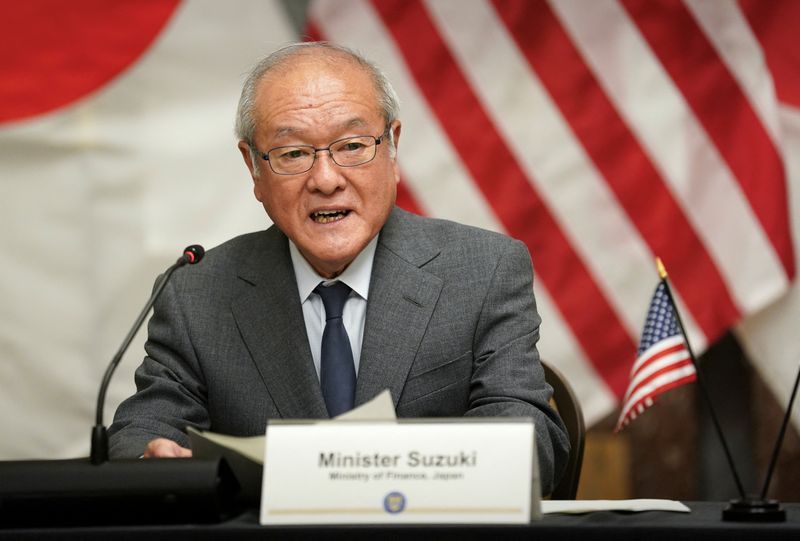
By Leika Kihara and Makiko Yamazaki
TOKYO (Reuters) -Japanese Finance Minister Shunichi Suzuki said last week's meeting with his U.S. and South Korean counterparts has laid the groundwork for Tokyo to act against excessive yen moves, issuing the strongest warning to date on the chance of intervention.
"I voiced strong concern on how a weak yen pushes up import costs. Our view was shared not just in a meeting with my South Korean counterpart, but at the trilateral meeting that included the United States," Suzuki told parliament on Tuesday.
"I won't deny that these developments have laid the groundwork for Japan to take appropriate action (in the currency market), though I won't say what that action could be," he said.
The fresh warnings came after the dollar rose to 154.85 yen, its strongest levels against the Japanese currency since 1990, keeping markets on heightened alert for any signs of intervention from Tokyo to prop up the yen.
The United States, Japan and South Korea agreed to "consult closely" on foreign exchange markets in their first trilateral finance dialogue last week, acknowledging concerns from Tokyo and Seoul over their currencies' recent sharp declines.
The rare warning from the three countries' finance chiefs, which was inserted in a joint statement after their meeting, was seen by some analysts as Washington's informal consent for Tokyo and Seoul to intervene in the market when necessary.
Japan could intervene in the currency market at any time as recent yen falls are excessive and out of line with fundamentals, ruling party executive Satsuki Katayama said.
"I don't think Japan will face any criticism if it were to act now," Katayama told Reuters in an interview on Monday, when asked about the timing of a possible currency intervention.
BOJ MEETING IN FOCUS
While a weak yen boosts exports, it has become a headache for Japanese policymakers as it inflates the cost of living for households by pushing up import prices.
At a regular news conference earlier on Tuesday, Suzuki stressed that Japanese authorities will work closely with overseas counterparts to deal with excessive volatility in the foreign exchange market.
"We are watching market moves with a high sense of urgency," Suzuki told reporters, adding that Tokyo authorities were ready to take action "without ruling out any options" against excessive currency moves.
Japanese policymakers may be escalating verbal warnings ahead of Japan's Golden Week holidays next week to keep traders on guard over the chance of intervention, said Hideo Kumano, chief economist at Dai-ichi Life Research Institute.
"Regardless of whether there will be one, markets are certainly more alert on the chance of intervention, he said.
The latest decline in the yen comes after a string of strong U.S. economic data, particularly on inflation, which pushed the dollar to five-month highs and reinforced expectations that the Federal Reserve is unlikely to be in a rush to cut interest rates this year.
That dynamic has focused market attention on how the yen's weakness would affect the timing of the next rate hike by the Bank of Japan, after BOJ Governor Kazuo Ueda last week signalled the central bank's readiness to tighten policy if the weak yen's boost to inflation becomes hard to ignore.
Speaking at a parliament session on Tuesday, Ueda said the BOJ will raise interest rates if trend inflation accelerates towards its 2% target as it expects.
The BOJ will conclude a two-day policy meeting on Friday. While markets are betting it would keep short-term rates unchanged, the central bank is expected to project inflation will stay around its 2% target for the next three years, sources have told Reuters.
Japan last intervened in the currency market in 2022, first in September and again in October, to prop up the yen.

By Anant Chandak
BENGALURU (Reuters) - India's business activity expanded at its fastest pace in nearly 14 years this month thanks to robust demand, according to a survey released on Tuesday that also showed easing input inflation and positive jobs growth.
That suggests India is well placed to remain the fastest growing major economy this year after posting strong expansion over the past few quarters.
HSBC's flash India Composite purchasing managers' Index, compiled by S&P Global, rose to 62.2 this month from March's final reading of 61.8.
The reading has been consistently above the 50-mark separating expansion from contraction since August 2021.
"Strong performance in both the manufacturing and service sectors, led by increased new orders, resulted in the highest composite output index since June 2010," noted Pranjul Bhandari, chief India economist at HSBC.
The strong expansion was led by services activity, with the index rising to a three-month high at 61.7 from March's 61.2, thanks to new business - a key gauge for demand - accelerating.
A manufacturing PMI held strong at March's 59.1 this month. Both output and new orders for goods continued to grow at a robust pace, albeit slightly slower than last month.
Overall international demand was solid and the composite sub-index rose to the highest since it was added to the survey in September 2014.
Strong sales improved the business outlook for the coming 12 months from a four-month low in March.
Efforts to meet rising demand supported jobs growth, which was the most pronounced in manufacturing where it increased at the fastest pace in one-and-a-half years.
However, employment generation among services firms was slower than in March.
Meanwhile, input costs cooled for both goods producers and their services counterparts but demand strength enabled passing on expenses to customers.
A stronger increase in output costs among manufacturing firms contrasted with a slower rise in the services industry.
"Manufacturing margins improved in April as firms were able to pass on higher prices to customers due to strong demand conditions," added Bhandari.
That means inflation may not fall fast enough for the Reserve Bank of India to start considering rate cuts any time soon as price rises were likely to stay above the central bank's 4% medium term target for longer.

